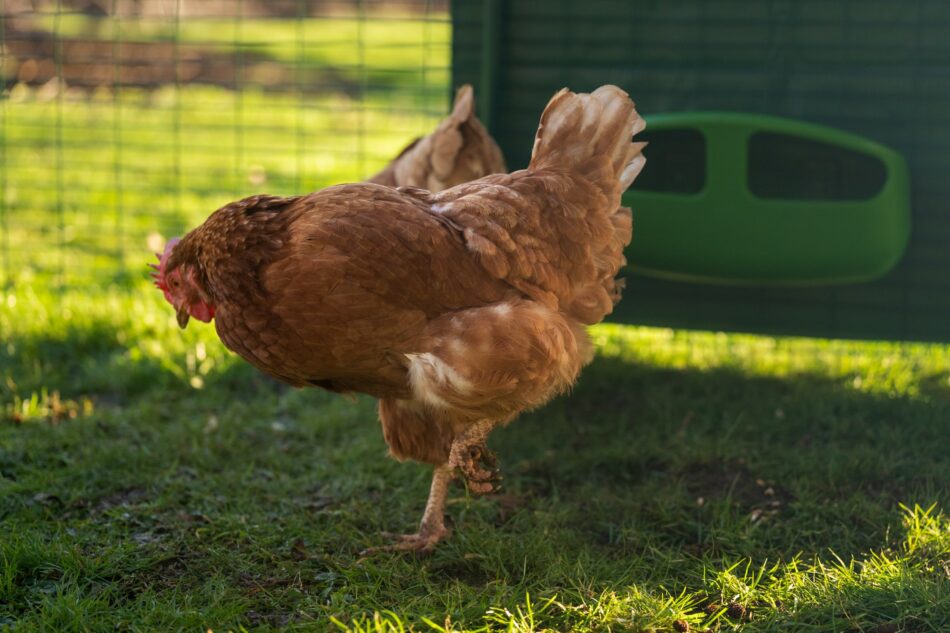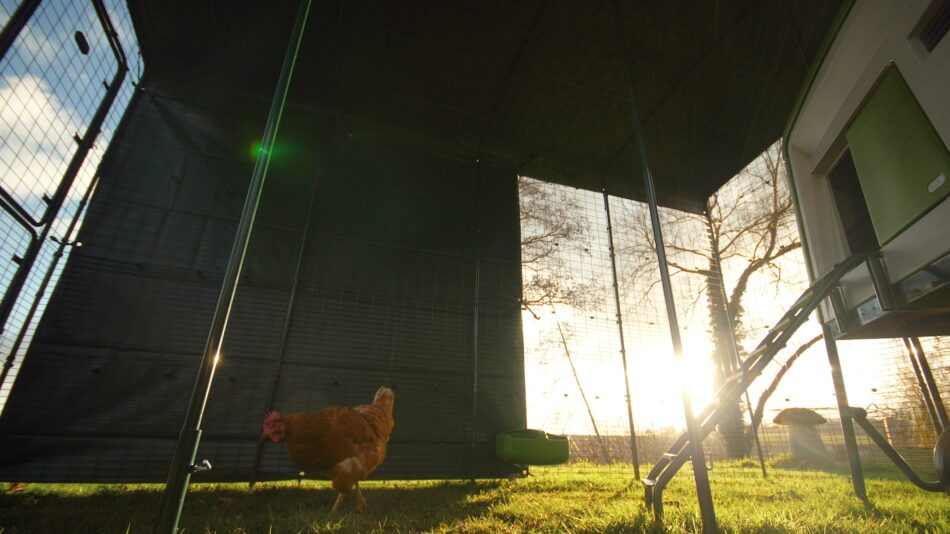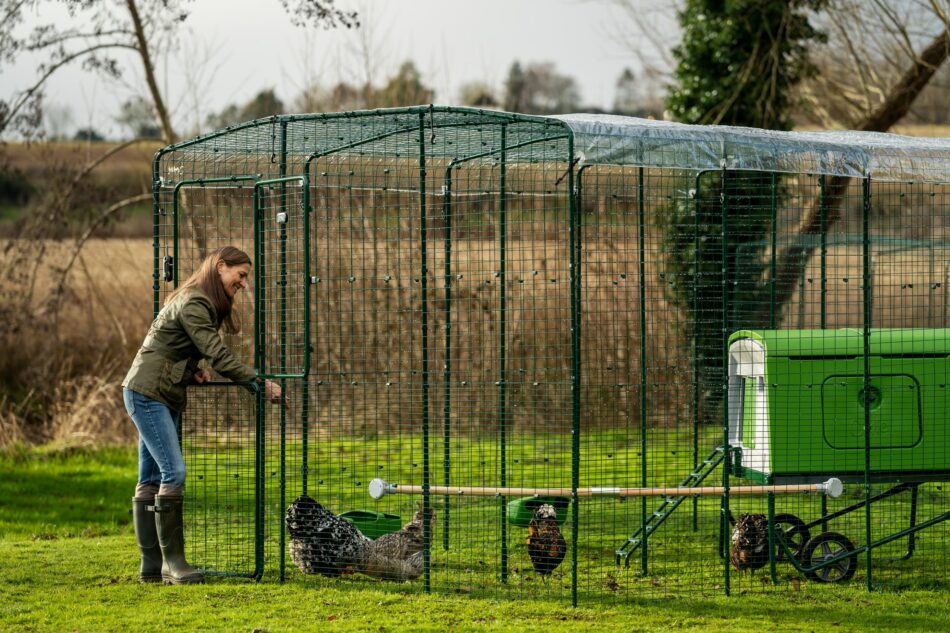Keeping chickens guide
Keeping chickens is a great pastime for people of all ages and walks of life. Backyard chicken keeping is rising in popularity, with more states and cities allowing small flocks in residential areas. With a few tips and tricks and a great setup, you can enjoy keeping your own flock of chickens in your own backyard.
Table of Contents
Are chickens the right pets for me?
Some of the things you’ll need to consider before keeping chickens are:
- Laws concerning chicken keeping in residential areas
- Time commitments
- Space requirements for chicken coops
- What breeds of chickens to keep
Chickens make wonderful pets that provide entertainment, companionship, and of course, eggs. The time needed to keep hens healthy and happy is flexible – and largely dependent on the breeds you’ve chosen and how you choose to keep your chickens. You can plan to spend anywhere from 1 to 4 hours per day tending to your flock.
Your flock will thrive on as much space you can feasibly provide them with. Hens naturally want to explore, forage, and scratch around in the earth, so the bigger the area, the more room for these activities.
Which chicken breed should I choose?
These breeds need more space than other breeds due to their desire to run and forage, or their size. Breeds that do well in confinement or smaller spaces include:
Chicken keeping laws
Laws concerning keeping chickens may apply to you if you live in a neighborhood – particularly if you’re part of a homeowners association (HOA). Each state has their own laws regarding keeping chickens, and each city may have different laws within a state. And, just because your state and city allow chickens doesn’t mean your HOA does – be sure to contact your city zoning office and HOA board before getting chickens to see what the rules are. Rules about flocks of chickens will likely include:
- How many chickens you can keep
- Where their coop is set up and how big it can be
- Restrictions on roosters
Where to buy hens & chicks
You can obtain your flock from breeders and hatcheries year-round, or from feed supply stores during the spring and summer months. Breeders may have adult hens for purchase, or you may be able to adopt grown chickens from individuals and rescue groups.
Chicks are fluffy and cute, and it may be tempting to start out with chicks instead of adult hens, but they require extra care and supplies that grown chickens do not. To raise chicks you’ll need:
- A special enclosure called a brooder pen
- Heat lamps or brooding plates
- Chick-specific feeders and waterers
- Feed formulated for chicks
Chicks need a heat source until they’re between 6 and 12 weeks old, depending on their breed. During this time they must be kept in their brooder pen and out of the elements, with short visits outside to slowly acclimate them to their environment.
Raising chicks can be rewarding, but if you don’t want to wait several months for your first eggs, or have to go through the process of keeping chicks in a brooder, starting with adult hens may be the best choice for you. Adult hens can go straight to your setup. And, with most breeds beginning to lay eggs by 16-20 weeks of age, older hens will be able to provide eggs for your family right away.
Choosing a coop
The best beginner chicken coop is one that will last a lifetime, with the ability to grow and be customized to accommodate your flock. Large chicken coops are best to start with, so that you have plenty of room to add to your flock, and to give your existing hens as much space as possible.
Omlet’s chicken coops have everything you need to get started keeping chickens. When choosing your chicken coop, you’ll want to weigh what is most important. Safety, comfort, and functionality should never be compromised in your chickens’ coop. When choosing between a wooden and plastic chicken coop, consider all of the upkeep involved with a wooden coop, and how difficult they are to clean. Our plastic chicken coops are easy to clean and keep your flock comfortable and protected all year round.
Choosing a chicken run
A chicken run will benefit your flock in many ways. From keeping them out of your prized flowers, to keeping them protected from predators, chicken runs help keep your hens healthy and happy. And, with the right chicken run, it will make keeping chickens even easier.
Walk in chicken runs are perfect for both keepers and flocks. They’re tall enough to give you access to walk with your flock, and offer enough space for them to exercise and explore their surroundings. All of our walk in runs feature anti-dig skirting to help prevent predators from tunneling in, and are fully enclosed with roof panels. And, with walk in chicken run extensions and chicken weather protection it’s easy to customize their experience and keep them sheltered from the elements.
Keeping your chickens protected from predators
Chickens are animals of prey, so it’s up to their keepers to keep them safe from predators. Along with a strong chicken coop and predator-resistant chicken run, an automatic chicken coop door is an extra layer of protection against invaders. Chicken predators are most active at night, so by having a coop door that closes automatically either based on the sun or a certain time, you’ll make sure they’re tucked in tight when they’re at their most vulnerable.
Keeping your chickens fed & watered
Chicken feeders and drinkers are an essential part of keeping chickens. They should be elevated enough to deter hungry rodents, and have a covering to keep moisture out and to prevent your hens from tossing food around. Chickens should be offered quality layer pellets free-choice, along with occasional chicken treats.
Your flock should also have clean, fresh water available at all times. In the summer, toss ice cubes into their waterers to keep them cool. In the winter, break ice often to make sure your hens have access to thawed water.
Entertaining your flock
Like most pets, chickens enjoy toys. It’s a way for them to entertain themselves and engage both their bodies and brains. Our unique flock favorites include:
- The Chicken Swing
- Customizable PoleTree chicken perch
- Chicken toys and accessories
When you add these enrichment items to your hens’ space, you’re adding joy for everyone. There’s nothing quite like watching your chickens exhibit their natural behaviors through play.
Encouraging egg production
When provided with quality food and safe housing, hens will start laying sometime between 16-20 weeks of age. There are ways to encourage your hens to lay eggs during periods of stress, but healthy hens will lay all year round with the exception of molting season (usually mid-late fall). Your chickens’ eggs can remain in the coop for several days without compromising their nutritional value, but gathering them daily is the best practice.
Store fresh, unwashed eggs at room temperature for weeks, or even longer in the refrigerator. Egg skelters are unique and functional display pieces to showcase the fruits of your laying hens’ labor.
A typical chicken-keeping routine
Your daily routine with your flock will probably look something like this:
Morning
- Let chickens out of their coop
- Dump the droppings tray, wipe it down, and refresh bedding
- Top off feeders and waterers for the day
Afternoon
- Check for eggs
- Ensure water is fresh and at a palatable temperature
Evening
- Ensure your hens are in their coop for the night
- Remove any leftover food from the run to discourage rodents from visiting
You’ll quickly learn the best time to offer treats and socialize with your hens based on their personalities. Some hens are more active in the morning, while others may be more willing to socialize in the evenings. Hens will usually lay their eggs late morning through late afternoon, and it’s best to give them their privacy during this time. Plan coop cleanings around your flock’s laying schedule.
Common chicken health problems
Chickens are generally hardy pets that are resilient in many climates and conditions. Healthy chickens are bright and alert with good appetites and a predictable laying schedule. And, your hens’ eggs can be a good indicator of their overall health.
There are no mandatory chicken vaccines in the US, and very few are approved for use in backyard flocks. The best way to keep your hens healthy is to perform regular chicken health checks. If you find anything unusual or suspect your chicken is ill, report your findings to your veterinarian.
Rarely, backyard flocks can contract avian flu, which is spread through the droppings and saliva of wild birds. Since there is no treatment for avian flu in chickens, covering your chickens’ run is the best way to prevent them from contracting the illness.
What to avoid when chicken keeping
Keeping chickens should be relaxing and enjoyable for both the flock and their owners. To eliminate potential stress while tending to your hens, avoid:
- Starting out with roosters
- Buying a wooden chicken coop that will rot and need constant repairs
- Setups without enough space for your flock
- Coops and runs that cannot be added onto or customized later
Chicken keeping with Omlet
Omlet is here to support you through your chicken-keeping journey – right from the beginning. From our fun and quirky chicken clothing to our practical and beloved chicken perches, we’ve got everything you need to get the most out of your newly forged relationships with your backyard flock. So sit back, relax, and know that Omlet is here to make keeping chickens easier and better than ever.
This entry was posted in Chickens



